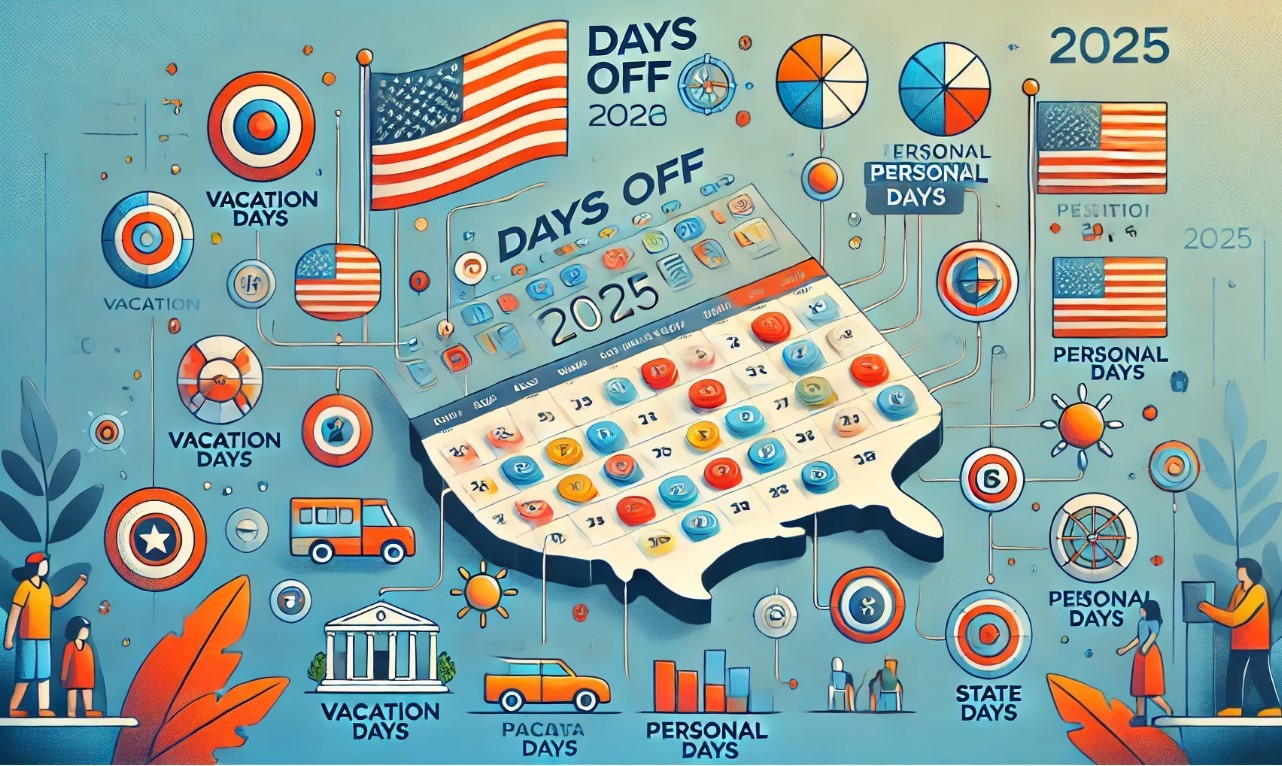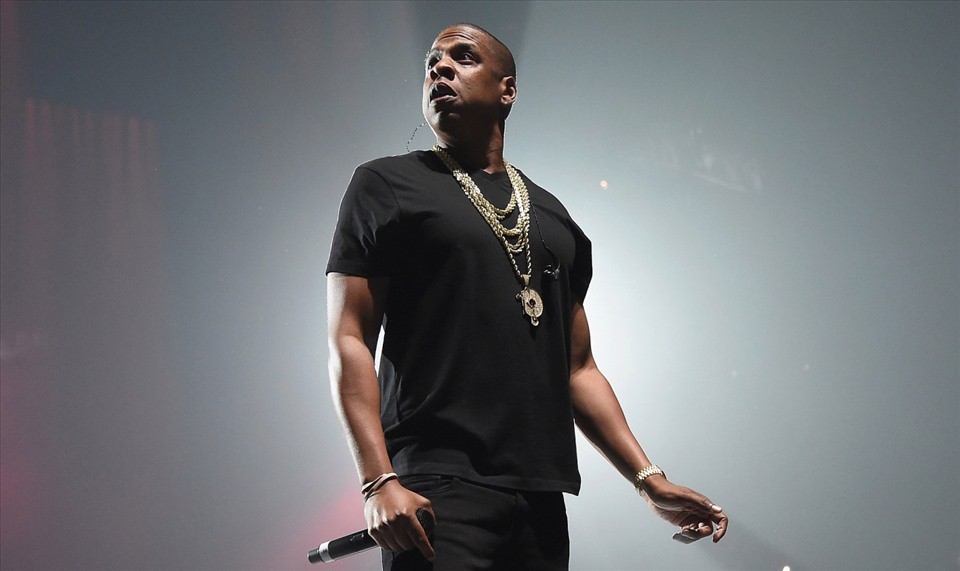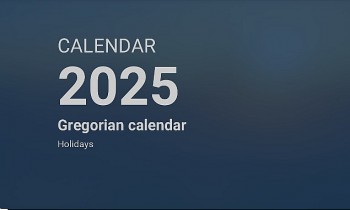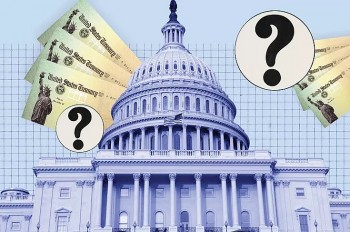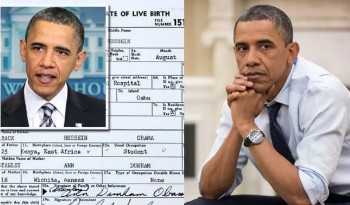South Korea Calendar in 2025 - List of Public Holidays, Festivals, and Regional Days
Overview: Public Holidays and Festivals in South Korea
In South Korea, public holidays and celebrations reflect the rich cultural tapestry of the nation, combining modern events with historical landmarks and old customs. These events are not only days off from work; they are deeply ingrained in the national identity of South Korea and provide an opportunity to honor ancestors, interact with family, and commemorate historical events.
South Korea's holidays fall generally into traditional and modern celebrations. Confucian and agricultural traditions underpin traditional holidays including Seollal (Korean New Year) and Chuseok (Harvest Festival). Families use this time to get together, engage in ancestral rites, and savor regional cuisine. Emphasizing their link to nature and the cyclical rhythm of life, these holidays are observed in line with the lunar calendar.
Conversely, contemporary holidays like Independence Movement Day and Liberation Day draw attention to important historical events that helped to define the country. They inspire Koreans of their fight for freedom and the sacrifices made by their ancestors. Official ceremonies, parades, and cultural presentations promoting national pride define these events.
Apart from these national holidays, South Korea's vibrant celebrations such as the Cherry Blossom Festival and the Lantern Festival give the calendar life. Not official public holidays, they draw millions of people and represent the creative and festive attitude of the country.
Together, these public holidays and celebrations define the pulse of South Korea's social and cultural life and offer the ideal mix of seriousness and festivity for residents as well as guests to enjoy.
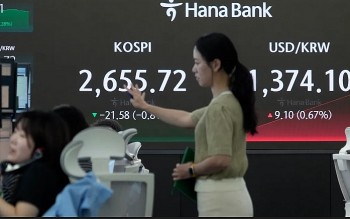 Korean Stock Market Holidays 2025: Key Dates, Unique Features, and Tips Korean Stock Market Holidays 2025: Key Dates, Unique Features, and Tips |
List of Public Holidays in South Korea 2025
1. New Year's Day (January 1, 2025)
- Date: January 1, 2025
- Significance: Like many countries worldwide, South Korea celebrates the Gregorian New Year. It is a time to bid farewell to the past year and welcome the new one with hope and ambition.
- Celebrations: People gather with family and friends, attend countdown parties, and enjoy fireworks displays. Many also visit Buddhist temples to ring bells and pray for prosperity.
- Closures: Government offices, schools, and stock markets are closed.
2. Korean New Year (Seollal) (January 28-30, 2025)
- Date: January 28-30, 2025
- Significance: Seollal marks the beginning of the lunar calendar year. It is one of South Korea’s most important traditional holidays, emphasizing family unity and ancestral remembrance.
- Celebrations: Families perform ancestral rituals called Charye, eat traditional dishes like tteokguk (rice cake soup), and play folk games such as yutnori. Wearing traditional attire, Hanbok, is also common.
- Closures: All public institutions, schools, and financial markets are closed for the duration of the holiday.
3. Independence Movement Day (March 1, 2025)
- Date: March 1, 2025
- Significance: This day commemorates the March 1st Movement of 1919, when Koreans protested against Japanese colonial rule.
- Celebrations: Official ceremonies are held nationwide, particularly at sites like Tapgol Park in Seoul, where the movement began. Citizens often display the national flag outside their homes.
- Closures: Schools and government offices are closed, but the stock market remains operational.
4. Children’s Day (May 5, 2025)
- Date: May 5, 2025
- Significance: This day celebrates the joy and importance of children. It was established to promote children’s well-being and rights.
- Celebrations: Families visit parks, zoos, and amusement parks. Many organizations host events specifically designed for children.
- Closures: Schools and most government offices are closed.
5. Buddha’s Birthday (May 15, 2025)
- Date: May 15, 2025
- Significance: Celebrating the birth of Siddhartha Gautama, the founder of Buddhism, this day is widely observed in South Korea, a country with strong Buddhist traditions.
- Celebrations: Temples across the nation hold lantern festivals and offer free meals to visitors. Religious ceremonies attract both devout Buddhists and curious travelers.
- Closures: Schools and government offices are closed.
6. Memorial Day (June 6, 2025)
- Date: June 6, 2025
- Significance: Memorial Day honors those who sacrificed their lives for South Korea’s independence and security.
- Celebrations: A national ceremony is held at Seoul National Cemetery. People observe a minute of silence at 10:00 AM as sirens sound across the country.
- Closures: Schools and government offices are closed; financial markets remain open.
7. Liberation Day (August 15, 2025)
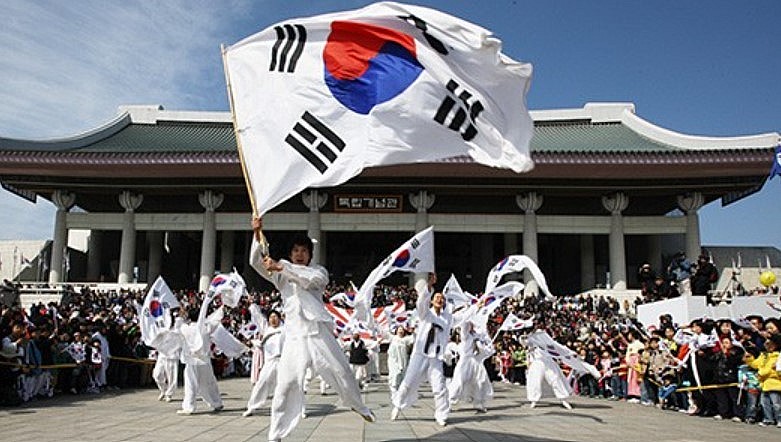 |
| Korean National Liberation Day |
- Date: August 15, 2025
- Significance: Commemorating Korea’s liberation from Japanese rule in 1945, this day is a reminder of the nation’s resilience and independence.
- Celebrations: The day is marked with parades, cultural performances, and flag-raising ceremonies.
- Closures: Schools, government offices, and most public institutions are closed.
8. Chuseok (Korean Harvest Festival) (September 6-8, 2025)
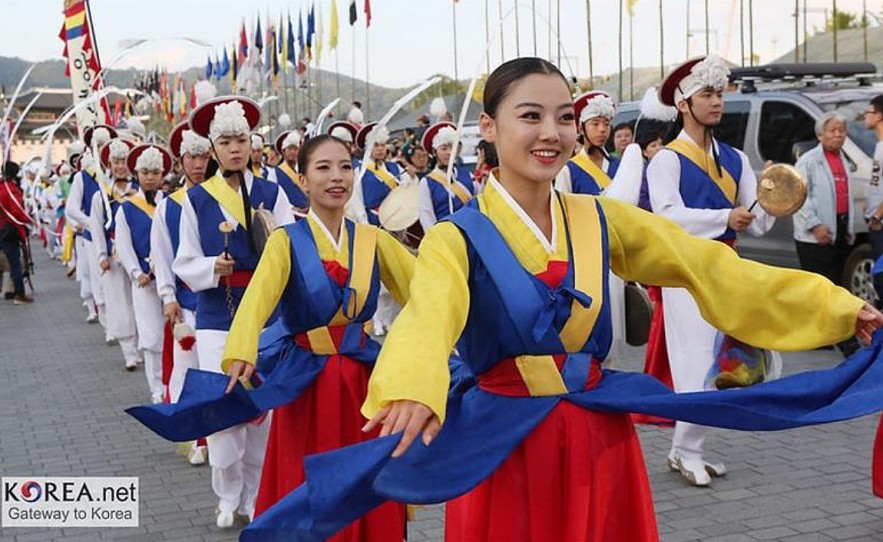 |
| Chuseok (Korean Thanksgiving), one of Korea's two biggest holidays |
- Date: September 6-8, 2025
- Significance: Known as the Korean Thanksgiving, Chuseok is a time to thank ancestors for a bountiful harvest.
- Celebrations: Families gather to perform Charye, visit ancestral graves, and enjoy traditional dishes like songpyeon (rice cakes).
- Closures: Public offices, schools, and markets close for the three-day holiday.
9. National Foundation Day (October 3, 2025)
- Date: October 3, 2025
- Significance: This day celebrates the legendary founding of Korea by Dangun, the mythical first king, in 2333 BCE.
- Celebrations: Ceremonies are held at sacred sites such as Mount Mani on Ganghwa Island.
- Closures: Schools and government offices are closed.
10. Hangeul Day (October 9, 2025)
- Date: October 9, 2025
- Significance: This day celebrates the creation of Hangeul, the Korean alphabet, by King Sejong in 1443.
- Celebrations: Events highlight the importance of literacy, and museums host special exhibitions about King Sejong’s achievements.
- Closures: Public offices and schools are closed.
Observances and Regional Holidays in South Korea in 2025
While South Korea officially observes 16 national public holidays in 2025, the country also celebrates a range of local, regional, and unofficial holidays. These occasions, while not recognized nationwide, highlight the diversity of South Korea’s cultural and historical traditions. They offer additional opportunities to connect with the unique characteristics of specific provinces or commemorate events that hold special significance for smaller communities.
Regional and Provincial Holidays
South Korea’s regional holidays are often tied to historical, cultural, or agricultural traditions. While these days are not official public holidays, they are widely celebrated within specific areas, bringing local communities together in festive or solemn observances.
-
Jeju Fire Festival (February 2025)
- Location: Jeju Island
- Significance: This festival celebrates Jeju’s traditional practice of burning old grass to prepare farmland for the upcoming planting season.
- Activities: Visitors can enjoy large bonfires, fireworks displays, traditional games, and performances. The festival also includes ritual prayers for a prosperous harvest.
-
Jinju Lantern Festival (October 2025)
- Location: Jinju City, South Gyeongsang Province
- Significance: This festival commemorates the Jinju Battle during the Imjin War (1592–1598). Lanterns symbolize messages of remembrance for fallen soldiers.
- Activities: The Namgang River is illuminated with thousands of floating lanterns, accompanied by parades, cultural exhibitions, and traditional music performances.
-
Gangneung Danoje Festival (June 2025)
- Location: Gangneung, Gangwon Province
- Significance: Recognized as a UNESCO Intangible Cultural Heritage, this festival dates back over 1,000 years and honors the gods of agriculture.
- Activities: Rituals, mask dances, and wrestling competitions take place alongside markets selling traditional foods and crafts.
-
Boryeong Mud Festival (July 2025)
- Location: Boryeong, South Chungcheong Province
- Significance: Originally created to promote local mud-based cosmetics, this festival has become a globally recognized event.
- Activities: Tourists and locals engage in mud wrestling, mud slides, and spa treatments, making it a fun and rejuvenating experience.
Observances and Unofficial Holidays
South Korea also has several observances that, while not legally designated as holidays, are widely respected and observed. These dates often reflect themes of national pride, remembrance, or social causes.
-
Parents’ Day (May 8, 2025)
- Significance: Dedicated to honoring parents and expressing gratitude for their sacrifices.
- Activities: Children present their parents with carnations and gifts. Schools and organizations host events to promote family values.
- Public Impact: Although not a public holiday, it is widely recognized with special ceremonies and family gatherings.
-
Teachers’ Day (May 15, 2025)
- Significance: Celebrates educators and their contributions to society.
- Activities: Students and parents give teachers small tokens of appreciation, such as flowers or handwritten notes. Some schools organize events to honor faculty.
- Public Impact: Schools remain open, but the day holds cultural significance.
-
Black Day (April 14, 2025)
- Significance: Observed by singles as a counterpart to Valentine’s Day and White Day.
- Activities: Singles gather to eat jjajangmyeon (black bean noodles) and commiserate in a lighthearted celebration of singlehood.
- Public Impact: It’s an informal cultural observance, particularly popular among younger generations.
-
Arbor Day (April 5, 2025)
- Significance: Encourages tree planting and environmental conservation.
- Activities: Government initiatives promote tree planting campaigns. Schools often hold educational programs about nature conservation.
- Public Impact: Although it used to be a public holiday, Arbor Day is now a working day observed mainly by environmental groups and schools.
-
Pepero Day (November 11, 2025)
- Significance: A playful, consumer-driven holiday where people exchange Pepero (stick-shaped snacks) as a token of affection.
- Activities: Couples and friends exchange Pepero, with stores offering themed promotions and special editions.
- Public Impact: It’s a fun, unofficial holiday celebrated by young people, particularly in schools and workplaces.
Significance of Regional and Unofficial Holidays
These holidays and observances reflect the regional diversity and modern cultural trends of South Korea. Regional holidays, rooted in history and local customs, help preserve the unique identities of various provinces, while unofficial observances showcase the creativity and adaptability of contemporary Korean society. Together, they highlight the country’s ability to balance tradition and modernity.
Whether participating in a centuries-old ritual or enjoying a fun, quirky celebration like Pepero Day, locals and visitors alike can find plenty to appreciate in South Korea’s varied calendar of events. These additional celebrations provide enriching experiences that go beyond the national holidays, giving deeper insight into the vibrant culture of the country.
Conclusion
South Korea's public holidays and festivals in 2025 offer a glimpse into the country’s vibrant culture and historical significance. These occasions are not only moments for relaxation but also serve as opportunities to celebrate national pride, family unity, and time-honored traditions. From deeply rooted holidays like Seollal and Chuseok to modern commemorations such as Liberation Day and Hangeul Day, each holiday carries its unique flavor and significance.
Whether you’re a resident or a traveler, participating in these holidays provides a deeper understanding of Korean values, history, and customs. They also offer a chance to experience firsthand the warm hospitality and communal spirit that define South Korean society. By planning ahead, you can fully enjoy these moments of festivity and reflection in this culturally rich and dynamic country.
FAQs
1. What is the most important holiday in South Korea?
The most important holidays in South Korea are Seollal (Korean New Year) and Chuseok (Harvest Festival). These holidays emphasize family gatherings and ancestral rituals, reflecting the nation’s deep-rooted traditions.
2. Are South Korean public holidays based on the lunar or solar calendar?
South Korea observes both lunar and solar calendar-based holidays. Traditional holidays like Seollal and Chuseok follow the lunar calendar, while modern holidays such as Liberation Day and Independence Movement Day are based on the solar calendar.
3. How do South Koreans typically celebrate their holidays?
Celebrations vary by holiday. Traditional holidays often involve family gatherings, ancestral rites, and traditional foods, while modern holidays are marked with public ceremonies, cultural events, and displays of national pride.
4. Are public holidays in South Korea mandatory days off for all workers?
Public holidays are typically observed by most workplaces and schools. However, private companies may have their own policies, so some workers might need to negotiate holiday leave.
5. Are shops and tourist attractions open during public holidays?
While government offices and schools close, many shops, restaurants, and tourist attractions remain open, especially in major cities. Popular tourist sites may even host special events during holidays.
6. What should travelers keep in mind when visiting South Korea during holidays?
During major holidays like Seollal and Chuseok, transportation can be heavily booked, and cities may feel quieter as people travel to their hometowns. However, this is also a great time to experience unique cultural traditions and local hospitality. It’s advisable to plan accommodations and transportation well in advance.
 Top 20 Most Well-Known Korean Webtoons in English of All Time Top 20 Most Well-Known Korean Webtoons in English of All Time Webcomics have grown in popularity thanks to numerous websites that receive a ton of daily visitors. The top 20 most well-known Korean webtoons in English ... |
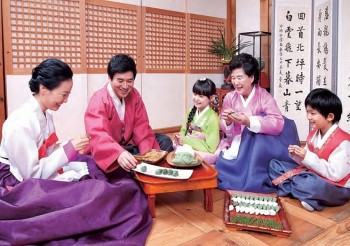 Full List of South Korea’s Public Holidays In 2024 Full List of South Korea’s Public Holidays In 2024 Whether you're a city dweller or a nature enthusiast, South Korea has the best of both worlds in one. Check out Full List of South ... |
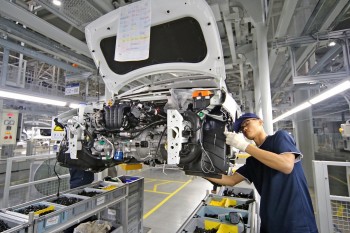 Top 10 Largest Companies In South Korea By Market Cap (2024 Update) Top 10 Largest Companies In South Korea By Market Cap (2024 Update) Which company in South Korea is the biggest and the most famous? Based on market capitalization, we have listed 10 biggest companies. |
 Top 10 Best Free Sites To Read Korean Webtoons in English (Legally) Top 10 Best Free Sites To Read Korean Webtoons in English (Legally) South Korean comics, commonly referred to as Korean manhwa, are gaining popularity online. If you enjoy Korean drama, you are undoubtedly aware that Korean manhwa ... |
 Top 6 Most Popular Refrigerator Brands In South Korea Top 6 Most Popular Refrigerator Brands In South Korea Because South Korean refrigerator brands are high-quality and long-lasting, anyone shopping for one should give them some thought. View the list of South Korea's Top ... |


